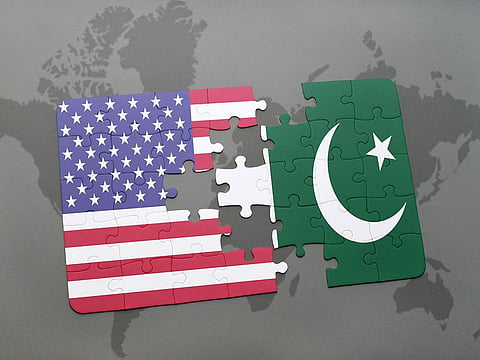The future of US cooperation with Pakistan
Islamabad seeks a broad based relationship with Washington DC focused on geoeconomics

Wading through the Pakistan-US relations, even at the best of the times, are a challenge. The nature and the confusion emanating from the American withdrawal from Afghanistan has shone light on the nature of the Pakistan-American relations.
Taliban victory is seriously testing Pakistan’s long fraught bilateral relationship with America, writes Madiha Afzal of Brookings Institution.
During this relationship that began in early 1950s both sides claimed to understand each other’s needs, but that was not always the case.
In the meantime the interests of either side were only partially served when “each side used the other to advance its own agenda that impacted negatively on other’s interests” writes Tauqir Hussain a former Pakistani diplomat now on the faculty of Georgetown University.
Consequently, every time when America’s immediate needs were met, Pakistan felt passed over — most notably immediately after the Soviet withdrawal from Afghanistan in 1989 when the US imposed nuclear related sanctions on Pakistan and now the lukewarm approach of the Biden administration vis-a-vis Islamabad since the US withdrawal from Afghanistan last August.
Convenient scapegoat
The near unanimous view in Pakistan is that instead of owning up to its own flawed policy and botched execution of Afghan campaign, the Americans find it convenient to scapegoat Pakistan.
The American policy still looks at Pakistan through an Afghan prism and requires Islamabad for a specific purpose of over the horizon counter-terrorism operations in Afghanistan. Pakistan seeks broad based relations focusing on geoeconomics, and the use of economic tools to advance its geopolitical objectives.
This short termism in American attitude towards Pakistan is an issue. While cold shouldering, what was once ‘the most allied ally’ a sizeable number among American policymakers and interests call for revisiting America’s relations with Pakistan.
Secretary of State Antony Blinken assured the Congress that the administration is looking at the role Pakistan played during the past years and what role the US would want it to play in the future.
Specific and narrow purpose
Wendy Sherman, the deputy secretary of state, the highest placed American official to visit Pakistan since Biden took over made it plain in October 2021. Departing from Mumbai for Pakistan, in an answer to a journalist’s question, she said “we (US) don’t see ourselves building our broad relationship with Pakistan and we have no interest in returning to the days of a hyphenated India, Pakistan,” adding that her trip to Pakistan was aimed at accomplishing a “specific and narrow purpose (Afghanistan)”.
As far as the foreign policy priorities of Biden administration are concerned there is little likelihood of a significant shift in American policy towards Pakistan.
Similarly, it is now wrong for the Americans to expect that Pakistan would remain a service provider state at the expense of its vital security interests. The much-changed geopolitical realities and increasing alignment between China and Pakistan also casts a shadow over Washington’s policy towards Pakistan.
The United States is Pakistan’ top export destination while Pakistan stands at number 56 for America. Pakistan has multiple interests tied to relations with the US of which strategic is not one.
A nuclear armed state of over 220 million people cannot just be wished away. Sooner, rather than later, US will realise the benefits of its relations with Pakistan.
Living next door to a country (Afghanistan) in a state of war for nearly half a century has changed Pakistan. No one except Pakistanis understand it.
Commenting on the decades’ long relationship between Pakistan and the United States, the US state department’s spokesperson Ned Price said last week: “Pakistan is a strategic partner of the United States. We have an important relationship with the government in Islamabad, and it’s a relationship that we value across a number of fronts.”
While faultlines and hiccups remain, it seems that the strategic importance of the US-Pakistan relationship endures.
Sajjad Ashraf served as an adjunct professor at the Lee Kuan Yew School of Public Policy at the National University of Singapore from 2009 to 2017. He was a member of Pakistan Foreign Service from 1973 to 2008 and has served as an ambassador to several countries.


